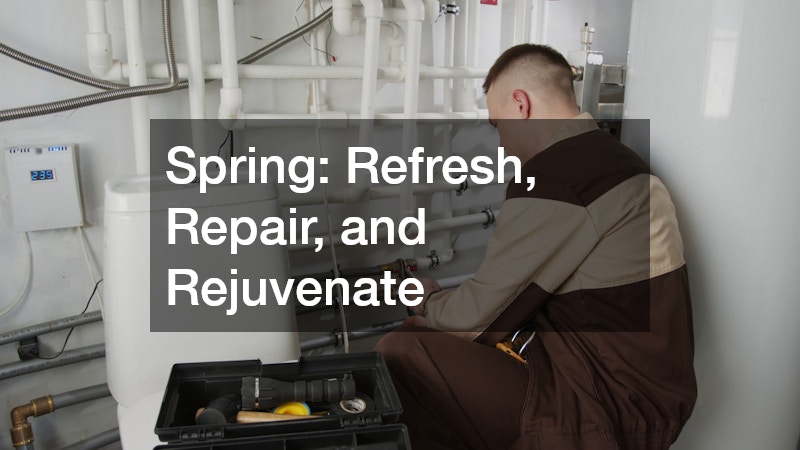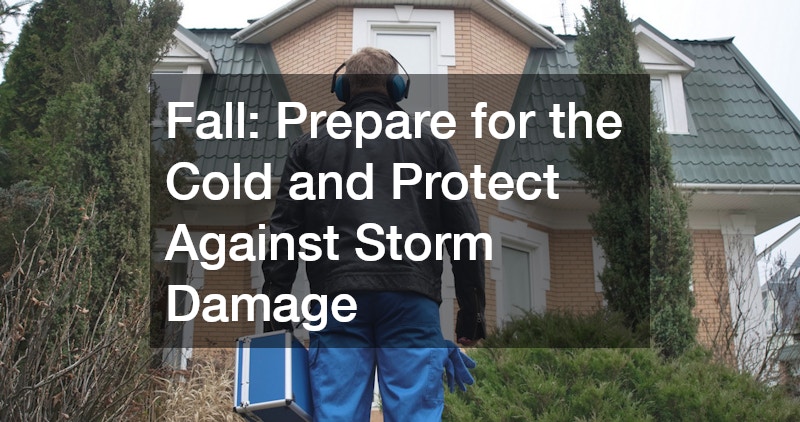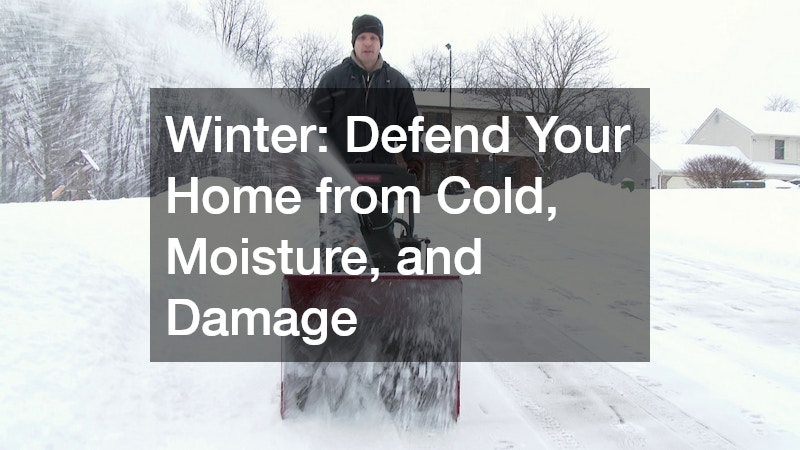
A well-maintained home doesn’t just look good—it performs better, lasts longer, and costs less to operate. Yet many homeowners treat maintenance as a reactionary task, waiting until something breaks before taking action. This approach often leads to higher expenses and unnecessary stress. By taking a proactive, seasonal approach, homeowners can anticipate potential issues, schedule timely repairs, and enjoy peace of mind throughout the year.
From managing heating and cooling systems to checking roofs and plumbing, every component of a home benefits from routine care. Reliable plumbing companies, HVAC experts, and residential roofing services can help detect early warning signs before they turn into costly damage. With the right schedule and specialist maintenance services, your home can stay safe, efficient, and comfortable through every season.
Spring: Refresh, Repair, and Rejuvenate

A. Inspect for Water Damage and Leaks
After the long, cold months of winter, spring brings the perfect opportunity to evaluate your home’s condition. Snowmelt and heavy rains can expose hidden leaks or water intrusion issues that developed over winter. Begin your seasonal inspection by walking through your property, paying special attention to basements, attics, window sills, and roof edges.
If you notice stains, peeling paint, or damp smells, call local water damage companies for a professional assessment. These specialists use moisture detection tools to uncover problems that might not be visible to the naked eye. Early intervention prevents mold growth and structural deterioration—issues that are far more expensive to address later.
Spring Water Damage Checklist:
-
Inspect gutters and downspouts for debris.
-
Check for leaks in ceilings, basements, or crawl spaces.
-
Reseal windows, doors, and foundation cracks.
-
Schedule roof and siding inspections for hidden moisture damage.
By addressing water damage early, homeowners protect their property’s structural integrity and prevent more extensive repairs down the line.
B. Tune-Up Plumbing and Drainage Systems
Spring also signals the right time to give your plumbing system some attention. During winter, frozen pipes, low temperatures, and minimal water flow can strain the system. Hire plumbing companies to inspect for corrosion, weak seals, and leaks that may have developed during the colder months.
Equally important is scheduling septic pumping services. Septic tanks accumulate solids that can lead to blockages and unpleasant odors if ignored. Most homeowners should arrange pumping every three to five years, but more frequent servicing might be needed depending on household size and usage.
Spring Plumbing Maintenance Tips:
-
Flush water heaters to remove sediment buildup.
-
Inspect outdoor faucets and hoses for leaks.
-
Ensure sump pumps are working before rainy weather.
-
Check the drain flow and water pressure throughout the home.
These preventive steps ensure your plumbing system functions efficiently throughout the year and help you avoid emergency repairs during the wetter months.
C. Prepare for Warmer Weather with HVAC Servicing
As the temperatures climb, your cooling system becomes your home’s lifeline. Before the first heatwave hits, schedule AC maintenance services to ensure your system runs efficiently. Professional HVAC technicians will clean condenser coils, replace air filters, and check refrigerant levels, ensuring optimal performance and energy savings.
A well-tuned air conditioning system not only keeps your home cool but also maintains good air quality. Dust, pollen, and allergens accumulate during winter, and a clean system can make a noticeable difference in indoor comfort.
Quick HVAC Preparation Tips:
-
Replace or clean air filters monthly during peak use.
-
Inspect thermostat settings and battery levels.
-
Clear debris around outdoor condenser units.
-
Seal ductwork leaks to improve airflow.
With your air conditioning ready for summer, you can rest easy knowing your home will remain comfortable even during the hottest days.
Summer: Efficiency, Comfort, and Outdoor Protection

A. Improve Insulation and Energy Efficiency
Summer is often associated with rising energy bills, but much of this cost can be reduced through better insulation. Hiring spray foam insulation companies is an effective way to maintain comfortable indoor temperatures while cutting down on utility expenses. Spray foam forms an airtight seal in attics, crawl spaces, and walls, preventing cool air from escaping and hot air from entering.
Aside from insulation, homeowners can also:
-
Check door and window seals.
-
Upgrade to double-pane or low-emissivity windows.
-
Use reflective roofing materials or coatings.
-
Add attic ventilation to lower roof temperatures.
These upgrades not only enhance comfort but also improve your home’s overall energy efficiency, paying for themselves over time through reduced energy use.
B. Inspect Roofing and Skylights
Summer’s dry weather makes it ideal for inspecting and maintaining your roof. Neglecting your roof can lead to leaks, interior damage, and compromised insulation. Partnering with residential roofing services ensures a professional inspection for missing shingles, sagging areas, or weak flashing points.
For homes with skylights, regular maintenance is equally important. Skylight repairs can prevent water intrusion and heat loss while preserving natural light quality. Cracked seals or damaged flashing can lead to leaks, mold, and higher indoor humidity.
If your roof is nearing the end of its lifespan, summer is also a good time to consider roof replacement. Replacing your roof in dry, warm conditions minimizes project delays and ensures proper sealing and adhesion of materials.
C. Prioritize Electrical Safety
With more outdoor activities, appliances, and air conditioners running, electrical systems face extra demand in summer. Scheduling inspections with local electricians can prevent power surges, short circuits, and other hazards. Electricians can test your wiring, update outdated panels, and install surge protectors to safeguard your devices.
Summer Electrical Safety Tips:
-
Avoid overloading circuits with multiple high-energy appliances.
-
Ensure outdoor outlets are covered and grounded.
-
Install whole-home surge protection for storm season.
-
Replace damaged cords and inspect ceiling fans for wear.
By keeping your electrical system in top shape, you reduce the risk of fire hazards and ensure your home stays safe during peak energy use.
Fall: Prepare for the Cold and Protect Against Storm Damage

A. Roof and Gutter Maintenance
Fall is the perfect time to prepare your home for winter’s challenges. Begin by cleaning gutters and downspouts to prevent blockages that can cause ice dams and water damage. Once clear, have residential roofing services perform a detailed inspection of your roof. They’ll identify loose shingles, deteriorating flashing, or structural issues that need attention before heavy snow or rain arrives.
If your roof is aging or repeatedly leaking, consider scheduling roof replacement before temperatures drop. A new, well-insulated roof helps regulate indoor warmth and prevents costly heat loss during winter.
Fall Roofing Maintenance Checklist:
-
Clean leaves and debris from gutters.
-
Inspect flashing around chimneys and vents.
-
Repair minor leaks promptly.
-
Check attic insulation and ventilation.
Taking these preventive steps in autumn ensures that your home’s roof and drainage systems are ready for whatever the cold months bring.
B. Plumbing and Septic Preparation
Cold weather can wreak havoc on plumbing systems if pipes are left unprotected. Before the first freeze, call plumbing companies to check for leaks, replace worn insulation, and ensure all fixtures are in working order. They can also help you shut off and drain exterior water lines.
Don’t overlook your septic system. Septic pumping services are essential in the fall, as frozen ground can make winter servicing difficult. Regular maintenance helps prevent costly backups, odors, and overflows.
Pre-Winter Plumbing Steps:
-
Disconnect and drain garden hoses.
-
Insulate exposed pipes in basements and crawl spaces.
-
Test sump pumps before snowmelt season.
-
Locate and mark your septic tank for easy access in emergencies.
With these measures, your plumbing will be better equipped to handle the cold, reducing the risk of burst pipes and water damage.
C. Heating and Ventilation Readiness
Before temperatures plunge, prepare your heating system for months of heavy use. Many HVAC professionals offer combination AC maintenance services that include furnace inspections, filter replacements, and duct cleaning. Proper servicing ensures your heating system runs safely and efficiently.
Consider additional insulation improvements through spray foam insulation companies. Properly insulated attics and walls help retain heat, lowering utility bills and preventing cold drafts.
Fall Heating Preparation Tips:
-
Replace furnace filters every 90 days.
-
Inspect vents and flues for obstructions.
-
Test thermostats and smoke detectors.
-
Schedule a professional furnace tune-up.
By addressing these systems early, you’ll stay warm and energy-efficient all winter long.
Winter: Defend Your Home from Cold, Moisture, and Damage

A. Prevent Frozen Pipes and Water Damage
When temperatures drop, frozen pipes can cause some of the most severe home damage. Avoid costly repairs by insulating exposed plumbing and maintaining consistent indoor heat. Plumbing companies can help you identify high-risk areas and install pipe insulation or heat cables.
In case of burst pipes or leaks, local water damage companies can provide emergency restoration to mitigate mold and structural problems. Acting quickly after a water incident is essential to prevent secondary damage.
Winter Plumbing Protection Tips:
-
Keep cabinets open to allow warm air around pipes.
-
Let faucets drip during extremely cold nights.
-
Seal foundation cracks and entry points for drafts.
-
Monitor attic and basement humidity levels.
Preparedness and professional help ensure your home stays dry and protected even during harsh winter conditions.
B. Inspect Roofing and Skylights After Snowfall
Heavy snow and ice can strain roofing structures. Schedule an inspection with residential roofing services after major storms to detect ice dams, loose shingles, or roof sagging. Removing snow buildup promptly can prevent leaks and insulation damage.
Homes with skylights need additional attention. Skylight repairs may be necessary if you notice fogging between panes, leaks, or condensation. Maintaining these features not only preserves natural light but also prevents moisture damage during the thawing season.
If your roof is nearing the end of its lifespan, consider planning for a roof replacement in early spring to avoid recurring leaks and structural issues next winter.
C. Electrical and Lighting Safety Indoors
Winter often brings more indoor activity and holiday decorations, increasing electrical load. Local electricians can inspect circuits, outlets, and breakers to ensure they can handle the demand. They can also help install smart lighting systems to reduce energy use and enhance safety.
Winter Electrical Safety Tips:
-
Avoid plugging too many devices into one outlet.
-
Unplug unused holiday lights before bedtime.
-
Use surge protectors for heating appliances.
-
Replace outdated wiring or panels before adding new circuits.
A safe, reliable electrical system gives homeowners confidence during long, dark winter evenings.
D. Bathroom Comfort and Warmth Upgrades
Bathrooms can feel particularly chilly in winter. This is a good time to call bathroom contractors to upgrade your space with heated floors, improved ventilation, and energy-efficient fixtures. Installing low-flow faucets and toilets conserves water while enhancing comfort.
You can also add better insulation behind bathroom walls or replace old tiles with slip-resistant materials that retain warmth. Small updates like these improve functionality and make daily routines more pleasant.
Year-Round Maintenance Tips for a Safer, More Efficient Home
A. Regular Inspections and Preventive Care
While seasonal maintenance is essential, some tasks should be performed throughout the year. Schedule annual inspections with plumbing companies, residential roofing services, and local electricians to identify early signs of wear or malfunction. Preventive maintenance helps you avoid emergencies, extends the lifespan of your home systems, and ensures compliance with local safety standards.
Some companies even offer maintenance plans that include biannual checkups, emergency service priority, and energy efficiency evaluations—a great option for busy homeowners who prefer a hands-off approach.
Creating a home maintenance checklist for seasonal emergencies can make it much easier to keep your home in top condition. This checklist helps track key tasks such as plumbing inspections, HVAC tune-ups, roof assessments, and electrical checks. By using it alongside regular inspections, you can proactively address potential problems before they become costly, ensuring your home stays safe and efficient all year long.
B. Maintaining Indoor Air and Water Quality
Good indoor air and water quality contribute significantly to your family’s health. Routine filter changes, duct cleanings, and water softener servicing keep your environment safe and comfortable. AC maintenance services play a major role in controlling dust, allergens, and moisture buildup, especially during humid months.
Similarly, plumbing companies can check for pipe corrosion or contamination that might affect water quality. Consider installing water filtration systems or purifiers to reduce pollutants.
C. Keep a Seasonal Maintenance Calendar
One of the simplest yet most effective tools for maintaining your home is a seasonal maintenance calendar. Mark key tasks for each quarter—such as HVAC servicing, septic pumping services, roof inspection, and electrical testing—and set reminders to schedule them ahead of time.
When emergencies arise, knowing who to call makes all the difference. Keep a list of trusted professionals, including bathroom contractors, local water damage companies, and spray foam insulation companies, so you can act quickly when problems surface.
Conclusion: Stay Ahead of the Seasons
Your home is a major investment that deserves consistent care. By following a seasonal maintenance plan, you can avoid costly surprises, improve comfort, and preserve your property’s long-term value. Each season brings unique challenges—spring’s moisture, summer’s heat, fall’s storms, and winter’s cold—but proactive attention ensures that none of them catch you off guard.
Whether it’s scheduling roof replacement, fine-tuning your HVAC system, or calling in specialist maintenance services, staying ahead of potential issues keeps your home in peak condition year-round. Don’t wait for problems to appear—build a relationship with trusted professionals such as residential roofing services, plumbing companies, and local electricians who can provide reliable guidance and high-quality work.
With a clear plan, expert support, and regular upkeep, you’ll enjoy a home that’s safer, stronger, and more efficient in every season.





